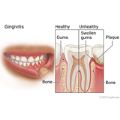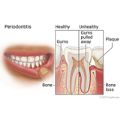Our Health Library information does not replace the advice of a doctor. Please be advised that this information is made available to assist our patients to learn more about their health. Our providers may not see and/or treat all topics found herein.
Topic Contents
Gum Disease
Condition Basics
What is gum disease?
Gum disease is an infection of the tissues that surround and support the teeth. It is also called periodontal disease.
There are two types of gum disease:
- Gingivitis (say "jin-juh-VY-tus") is gum disease that affects only the gums, the soft tissue that surrounds the teeth.
- Periodontitis (say "pair-ee-oh-don-TY-tus") is more severe. It spreads below the gums to damage the tissues and bone that support the teeth.
What causes it?
Gum disease is caused by the growth of germs called bacteria on the teeth and gums. Bacteria are present in plaque, a clear, sticky substance that your mouth produces.
What are the symptoms?
Healthy gums are pink and firm, fit snugly around the teeth, and do not bleed easily. When you have gum disease, you may see changes to your gums.
There are two types of gum disease: gingivitis and periodontitis. The symptoms are different for each condition.
Gingivitis causes:
- Gums that are red, swollen, and tender.
- Gums that bleed easily during brushing or flossing.
Gingivitis usually isn't painful, so you may not notice the symptoms and may not get the treatment you need.
In periodontitis, the symptoms are more advanced. They include:
- Gums that pull away from the teeth.
- Bad breath that won't go away.
- Pus coming from the gums.
- A change in how your teeth fit together when you bite.
- Loose teeth.
If you think you have gum disease, see your dentist right away. Early treatment can keep it from getting worse.
How is it diagnosed?
To find out if you have gum disease, your dentist or dental hygienist will do an exam. During the exam, they will look for problems like bleeding gums or areas where your gums are pulling away from your teeth. You may get X-rays of your teeth to look for bone damage and other problems.
How is gum disease treated?
Early treatment of gum disease is very important. It can help prevent permanent gum damage, control infection, and prevent tooth loss.
For gingivitis, your dentist may prescribe antibiotics to help fight the infection. Your dentist may also suggest an antibacterial toothpaste to help reduce plaque and improve gingivitis.
For periodontitis, your dentist or dental hygienist may clean your teeth using a method called root planing and scaling. This removes the plaque and tartar buildup both above and below the gum line.
You may need surgery if these treatments don't control the infection. Surgery may also be needed if you have severe damage to your gums or teeth.
After surgery, you may need to take antibiotics or other medicines to aid healing and prevent infection.
How can you prevent it?
Gum disease is most common in adults, but it can affect anyone, even children. So good dental habits are important throughout your life.
- Brush your teeth 2 times a day, in the morning and before bedtime, with a fluoride toothpaste.
- Floss once each day.
- Visit your dentist for regular checkups and teeth cleaning.
- Don't use tobacco products.
Related Information
Credits
Current as of: July 31, 2024
Author: Ignite Healthwise, LLC Staff
Clinical Review Board
All Ignite Healthwise, LLC education is reviewed by a team that includes physicians, nurses, advanced practitioners, registered dieticians, and other healthcare professionals.
Current as of: July 31, 2024
Author: Ignite Healthwise, LLC Staff
Clinical Review Board
All Ignite Healthwise, LLC education is reviewed by a team that includes physicians, nurses, advanced practitioners, registered dieticians, and other healthcare professionals.
This information does not replace the advice of a doctor. Ignite Healthwise, LLC disclaims any warranty or liability for your use of this information. Your use of this information means that you agree to the Terms of Use and Privacy Policy. Learn how we develop our content.
To learn more about Ignite Healthwise, LLC, visit webmdignite.com.
© 2024-2025 Ignite Healthwise, LLC.






